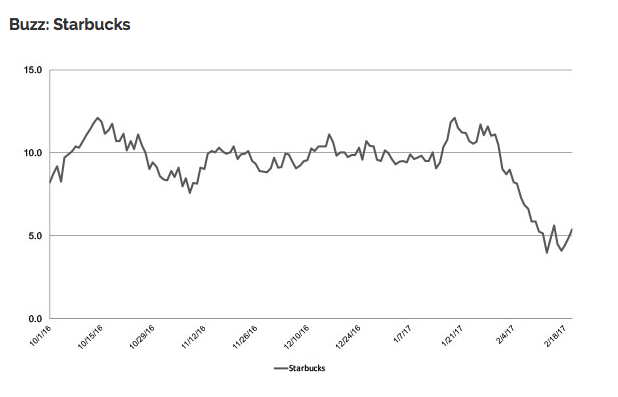Starbucks hasn't seen 'substantive impact' since vowing to hire refugees

Starbucks released a letter from a market research firm that refutes that the coffee giant’s brand perception dropped after the company vowed to hire 10,000 refugees in response to President Trump’s travel ban order.
The market research firm, Kantar Millward Brown, has worked with Starbucks since 2013 to commission brand perception insights on behalf of the coffee chain. The study is conducted online with a nationally representative sample of adults 18 and older. They didn’t find any substantive changes to the Starbucks brand, according to a letter they sent the company.
“Kantar Millward Brown has provided continuous Brand Equity measurement for Starbucks since 2013. Following the recent release of results from a YouGov Brand Index Survey, several news organizations have reported that Starbucks is suffering from consumer backlash related to its announcement to hire 10,000 refugees globally over the next five years. Such backlash or declines are not substantiated in our own measurement of Starbucks Brand Health and Consumer Sentiment,” Brian James, the president of Kantar Millard Brown, wrote in a letter to Matt Ryan, Starbucks’ chief strategy officer.
The letter continued: “Kantar Millward Brown has conducted on-going monthly measurement of Starbucks Brand Perceptions and Consumer Sentiment toward the Brand and saw no such impact in February 2017. In fact, in February 2017—after the announcement—we did not observe any substantive impact on Customer Consideration, Future Visitation Intent or Brand Perceptions or any other key performance metrics for the Starbucks brand.”
In mid-February, YouGov released a report that Starbucks’ (SBUX) brand perception had fallen by two-thirds after Starbucks CEO Howard Schultz released his letter promising to hire refugees.

More recently, Bloomberg News reported that xAd — a market insights firm that uses customers’ mobile phone apps to track foot traffic — showed Starbucks’ share of foot traffic dropped to 11% in February, down from 12% in January. xAd’s methodology uses location data from ad requests from 100,000 mobile apps each month. A visit to a location is only recorded when the app is open and the ad has been served.
On Jan. 29, Schultz sent out a company-wide letter following Trump’s decision to sign an executive order temporarily halted citizens from Iran, Iraq, Libya, Somalia, Sudan, Syria, and Yemen from entering the US. (That order has been stymied in court. This week, Trump signed a new travel ban executive order that excludes Iraq.)
In the letter, Schultz detailed plans to hire 10,000 refugees in the countries where the coffee chain operates. This was met with some backlash on social media, with some users calling for a boycott of Starbucks.
“We have a long history of hiring young people looking for opportunities and a pathway to a new life around the world. This is why we are doubling down on this commitment by working with our equity market employees as well as joint venture and licensed market partners in a concerted effort to welcome and seek opportunities for those fleeing war, violence, persecution and discrimination,” Schultz wrote.
He continued: “There are more than 65 million citizens of the world recognized as refugees by the United Nations, and we are developing plans to hire 10,000 of them over five years in the 75 countries around the world where Starbucks does business. And we will start this effort here in the U.S. by making the initial focus of our hiring efforts on those individuals who have served with U.S. troops as interpreters and support personnel in the various countries where our military has asked for such support.”
Afterward, the hashtag #BoycottStarbucks started trending on Twitter, with some criticizing the company for not hiring 10,000 veterans. Starbucks already has a program in place dedicated to hiring military veterans.
Others, however, showed their support for the coffee giant on social media.
—
Julia La Roche is a finance reporter at Yahoo Finance. Follow her on Twitter.
Read more:
